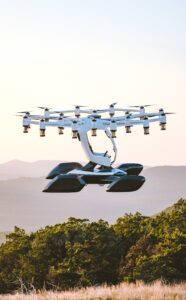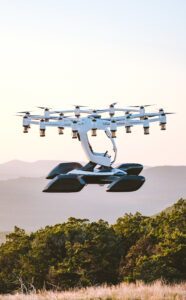
By DRONELIFE Features Editor Jim Magill
The city of Houston is laying the groundwork for establishing an Advanced Air Mobility (AAM) system in the surrounding region. As part of this effort, the Houston Airport System recently announced it was in discussions with several manufacturers of electric vertical takeoff and landing (eVTOL) aircraft, about establishing vertiports for air taxis at the city’s three major airports. DroneLife recently conducted an interview with Jim Szczsesniak, director of Aviation for the Houston Airport System to discuss the city’s vision for an AAM future.
(The following interview has been edited for length and clarity.)
DroneLife: Please tell me what plans the Houston Aviation Department has for the creation of operations centers for eVTOL aircraft.
Szczsesniak: I’m excited about the potential for eVTOL aircraft in Houston, but it’s important to acknowledge that we’re still in the early stages of planning. We’re actively exploring the creation of operations centers for eVTOL aircraft at our three airports: George Bush Intercontinental (IAH), William P. Hobby (HOU) and Ellington (EFD) airports. Initially, we will identify landing and take-off sites at out airports. However, it’s essential to note that these plans are still in the early stages, and many specifics need to be determined, primarily by the FAA and the manufacturers of eVTOLs.
DroneLife: What eVTOL companies is the Department in negotiations with?
The Department has had discussions with a number of the manufacturers such as Wisk and Archer. We anticipate meeting with other manufacturers as their aircraft near certification.
DroneLife: Does the department require any special certifications from the FAA to allow piloted eVTOL operations at its facilities? Pilotless, autonomous eVTOL flights?
Szczsesniak: The Houston Airport System would require oversight from the FAA for both piloted and autonomous eVTOLs, as it does for all current flight operations. We are closely monitoring developments in this area, but again, the industry as a whole needs to mature, and regulatory guidelines need to be established. Safety and compliance with FAA regulations are our top priorities in this endeavor.
DroneLife: Where on the airports’ properties would the eVTOL facilities be located?
Szczsesniak: We need to locate the facilities to be convenient for passengers but also work operationally with our airspace. We are assessing factors such as space availability, infrastructure requirements, and compatibility with existing flight operations as part of our evaluation of potential locations for eVTOL operations.
DroneLife: Will any special facilities have to be built to accommodate eVTOL flights at Houston’s airports?
Szczsesniak: HAS will be looking to match facilities with demand. Initially, we are looking to use existing facilities to handle start-up operations. Once the future demand becomes a little clearer, we will assess infrastructure requirements and explore options for the development of dedicated facilities to support the safe and efficient operation of eVTOL aircraft.
DroneLife: Has the city budgeted any money for the creation of an eVTOL operations system in Houston?
Szczsesniak: The initial plan for eVTOL infrastructure is to use existing facilities at the airports. This may require some painting and minor lighting system upgrades, so not much is initially forecast. As the market develops more funding may be required, but we don’t have an estimate for that yet.
DroneLife: In addition to constructing vertiports at Houston’s three major airports, does the Aviation Departments have any plans for creating takeoff and landing sites off the airport property?
Szczsesniak: Again, it’s too early to say, as these plans are still in the conceptual phase. Further evaluation and coordination with relevant stakeholders will be required before any specific plans can be finalized.
DroneLife: What is the demand for eVTOL flight operations in Houston?
Szczsesniak: The demand for eVTOL flight operations in Houston has the potential to be significant, considering the city’s robust transportation needs and population growth.
To provide some context, Bush Airport currently sees around 2 million passengers annually utilizing rideshare services for airport drop-offs. If even just one percent of these passengers opt for eVTOL transportation, it would translate to an estimated 55 trips per day to the airport. This demonstrates the potential for eVTOLs to capture a portion of the existing market demand for airport transportation services. As the industry continues to evolve and awareness of eVTOL technology increases, we anticipate further growth in demand for this innovative mode of transportation in Houston.
DroneLife: What sort of passenger is expected to want to use this service?
Szczsesniak: We expect a diverse range of passengers to utilize eVTOL services, including business flyers, casual travelers, and vacationers. The convenience and efficiency of air travel, especially in congested urban areas, will appeal to a broad demographic.
DroneLife: How is traveling in an eVTOL aircraft from one of Houston’s airports different from using ground transportation in terms of convenience? In terms of price?
Szczsesniak: Traveling in an eVTOL aircraft would offer several advantages over traditional ground transportation, including greater speed, flexibility and convenience. Passengers could enjoy direct, point-to-point transportation with minimal delays and congestion. While pricing may vary depending on factors such as route and demand, eVTOL services at our airports should aim to provide competitive pricing comparable to premium ground transportation options.
DroneLife: The nearby city of Sugar Land has announced its vision of creating a regional eVTOL system in the greater Houston area. Is Houston’s Aviation Department aware of these plans and is the Department coordinating with Sugar Land on this project?
Szczsesniak: We are aware of Sugar Land’s plans to create a regional eVTOL system and acknowledge the potential benefits of collaboration in this area. While our focus is primarily on the integration of eVTOL operations within our own jurisdiction, we recognize the importance of coordination and collaboration with neighboring communities to ensure a cohesive and efficient regional transportation network.
DroneLife: Does the city of Houston have an overall plan for creating a regional system to accommodate eVTOL flights in the area?
Szczsesniak: While we don’t have a finalized plan for creating a regional system to accommodate eVTOL flights in the Houston area, again, we are starting with identification of landing sites for eVTOLs at our airports. We recognize the potential benefits of integrating eVTOLs into our transportation network and are actively collaborating with relevant stakeholders to explore potential routes, infrastructure requirements, and operational considerations.
DroneLife: Does the Aviation Department have any plans to sell the public on the idea of traveling in air taxis, particularly ones without a pilot?
Szczsesniak: We are committed to engaging with the public and promoting awareness and understanding of EVTOL technology and its benefits, and we understand the importance of public education and outreach. As the industry evolves and eVTOL services become more widely available, we will continue to work closely with stakeholders to facilitate public acceptance and adoption of this innovative mode of transportation.
Read more:
Miriam McNabb is the Editor-in-Chief of DRONELIFE and CEO of JobForDrones, a professional drone services marketplace, and a fascinated observer of the emerging drone industry and the regulatory environment for drones. Miriam has penned over 3,000 articles focused on the commercial drone space and is an international speaker and recognized figure in the industry. Miriam has a degree from the University of Chicago and over 20 years of experience in high tech sales and marketing for new technologies.
For drone industry consulting or writing, Email Miriam.
TWITTER:@spaldingbarker
Subscribe to DroneLife here.

